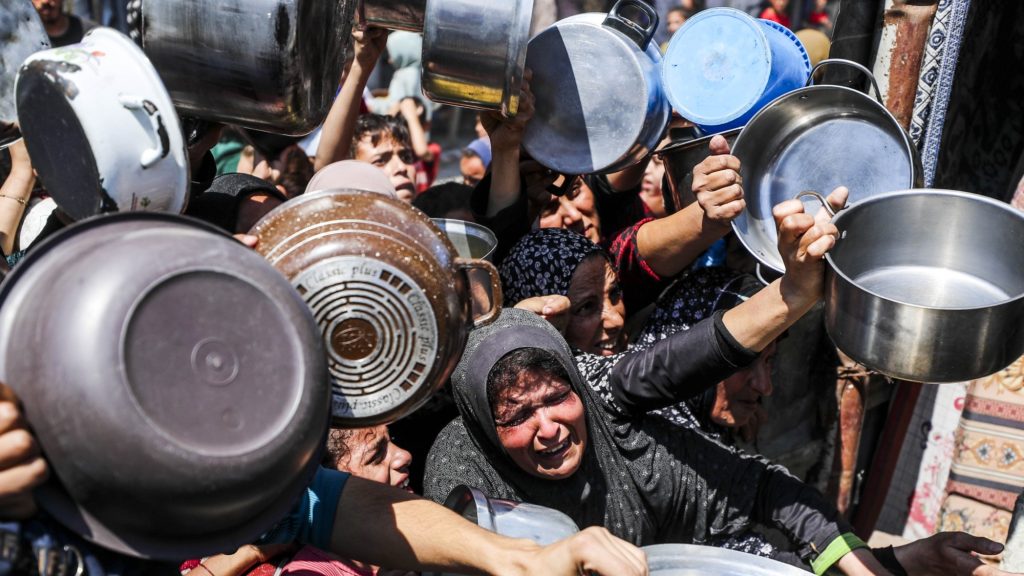More than 3,500 children in Gaza “face imminent death by starvation” after more than two months of total blockade by Israel, said Gaza’s Hamas-run Government Media Office.
The Israeli government cut off the enclave on 2 March as the ceasefire with Hamas began to disintegrate. It halted all supplies of humanitarian aid, including food, water and medicines, in a move it said was designed to pressure Hamas into releasing the remaining Israeli hostages.
On 25 April, the United Nations World Food Program said it had depleted all its food stocks for families in Gaza. International organisations are accusing Israel of weaponising starvation and humanitarian aid: a war crime.
What did the commentators say?
“A full-blown humanitarian emergency in Gaza is no longer looming,” said Sean Carroll, president of the non-profit group American Near East Refugee Aid, in The New York Times. “It is here, and it is catastrophic.”
Two million Palestinians, nearly half of them children, are “surviving on a single meal every two or three days”, and signs of “prolonged starvation are becoming more frequent and alarming”. This is “the moment of moral reckoning”. Will the world be “complicit in Gaza’s collapse”?
Israel‘s serial blockades have already become a “major test for international law”, said Boyd van Dijk, Oxford University’s Martin Fellow and a Geneva Conventions expert, in Foreign Affairs. In November, the International Criminal Court issued arrest warrants for Prime Minister Benjamin Netanyahu and Yoav Gallant, Israel’s former defence minister, alleging a “rarely invoked” war crime: “orchestrating a criminal starvation policy” against Gazans. And yet, despite its “long and devastating history” in conflict, intentional starvation of civilians is “notoriously difficult to prove”.
Last week the United Nations‘ top court, the International Court of Justice, separately began holding hearings to determine whether Israel had a legal duty to allow aid into Gaza, and to lift its ban on the UN’s Palestinian aid agency, UNRWA. The “strong legal consensus” is that Israel has “an absolute duty under the Geneva Conventions” to allow food in, said The Guardian. After all, “withholding food kills, just as bombs do”.
But Israel has refused to appear before the ICJ court in The Hague. Gideon Sa’ar, Israel’s foreign minister, described the proceedings as “shameful”. Donald Trump claimed last week that he had pushed Netanyahu to allow aid in – but the US has also told the ICJ that Israel’s security needs “override its obligation to do so”.
When Israel resorted to “using starvation as a weapon, there were few consequences and little strong condemnation from Western governments”, said Ramzy Baroud, editor of “The Palestine Chronicle”, in Arab News. Israel “continues to operate with impunity”, while much of the world “observes with varying degrees of anger, helplessness or total disregard”. We must hope that “fundamental human compassion, separate from legal frameworks, will compel the provision of essential supplies” into Gaza.
What next?
Israel is reportedly planning to resume aid delivery “in the coming weeks”, said The Guardian, but through a “radically new mechanism”. It still claims UNRWA – “essential to humanitarian efforts” – has been “mass-infiltrated by Hamas“, an allegation the UN strongly disputes. But the proposed Israeli alternative – international organisations and private contractors handing out food – “looks both unworkable and dangerous for civilians”.
On Sunday, Israel’s security cabinet approved plans to “step up its military campaign” in Gaza, and may even annex the territory, said Carroll in the NYT. While an immediate ceasefire and influx of aid are “urgently needed, that will not be enough”. There must be “a plan not just for relief but also for recovery, which cannot happen in a war zone or under permanent siege”.
Total blockade on food and aid enters its third month, and Israel is accused of ‘weaponising starvation’
